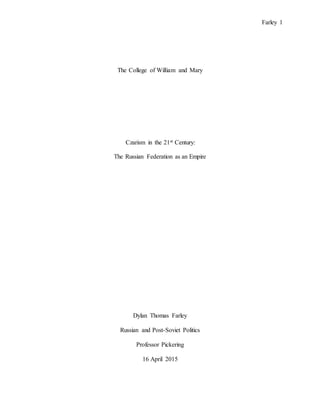
rpsfinalpaper
- 1. Farley 1 The College of William and Mary Czarism in the 21st Century: The Russian Federation as an Empire Dylan Thomas Farley Russian and Post-Soviet Politics Professor Pickering 16 April 2015
- 2. Farley 2 Czarism in the 21st Century: The Russian Federation as an Empire Russia Conclusion Standing by themselves, the modern Russian imperial components of government, nations, and territory do not equal an empire. Many states have one or two of these ingredients. Canada and Australia also have large territories crossing an entire continent, and the United States and Brazil have many indigenous nations within their borders. These in themselves do not indicate an empire, but Russia combines all of these aspects into its state, suggesting that it is in fact an empire. When it comes to Russians being the dominant ethnic group in the state, only Russians actually control entire large nations of millions of people. This contrasts sharply with America, which controls scattered and small Native American tribes or the United Kingdom and France, who control tiny island holdings. Another important comparison to make between Russia and other large, multi-ethnic states is that Russia is conspicuously bellicose. The United States is not trying to encourage parts of Ontario to break off and is not annexing Vancouver, unlike Russia’s current engagement in the Ukraine. Russia is the only major power that has exercised force in order to gain territory in current times. Critics may claim that Crimea wanted to be a part of Russia, but as recent as May 2013 only 23% of Crimeans thought, “Crimea should be separated and given to Russia” (International Republican Institute 17). This is proof that Russia’s move was not even done in the best interests of the Crimean people and was simply an act of imperial expansion. Russia will probably continue on this expansion trend for a while. It currently uses military influence in neighboring countries under the guise of peacekeepers, but effectively
- 3. Farley 3 foments unrest and crime in border regions (Ra’anan and Martin Chapter 3). Russia cannot resist becoming involved in “peripheral instability” and meddling in the affairs of its neighboring states (Mandelbaum 107). Looking to the future, a complete fragmentation of the Russian Federation is unlikely, although it is entirely possible that some ethnic republics break off, either forming larger states such as an Ingush-Chechen state or remaining separate polities. Russia would be forced to curtail its expansion only by outside prompting or resource constraints, because the Russian population views confrontation and expansion as nominal successes. Russians may someday feel that the state has had too many excesses in disregarding their personal freedoms, potentially initiating a color revolution. The Russian Federation fulfills all of the requirements for an empire. The Russian political system is authoritarian, enfranchising a strong centralized state with a president with extensive powers. Russia is composed of nearly 200 different nationalities of extremely different backgrounds with no state empowerment. Russia controls a vast territory stretching from Europe to the Bering Sea, encompassing a extremely different lands and peoples. The Russian Federation is definitively an empire in its characteristics and its actions.
- 4. Farley 4 Works Cited International Republican Institute,"Public Opinion Survey Residents of the Autonomous Republic of Crimea May 16-30, 2013." (2013): 1-40. International Republican Institute. USAID. Web. 15 Apr. 2015. King, Charles, and Rajan Menon. "Prisoners of the Caucasus." Foreign Policy 2010: 20-34. Web. 8 Apr. 2015. Mandelbaum, Michael. The New Russian Foreign Policy. New York, NY: Council on Foreign Relations, 1998. Print. Ra'anan, Uri, and Kate Martin. Russia: A Return to Imperialism? New York: St. Martin's, 1996. Print. Remington, Thomas F. Politics in Russia. New York: Longman, 1999. Print. Ross, Cameron. Regional Politics in Russia. Oxford Road, Manchester: Manchester UP, 2002. Print. "Russia." CIA World Factbook. Central Intelligence Agency, n.d. Web. 15 Apr. 2015.